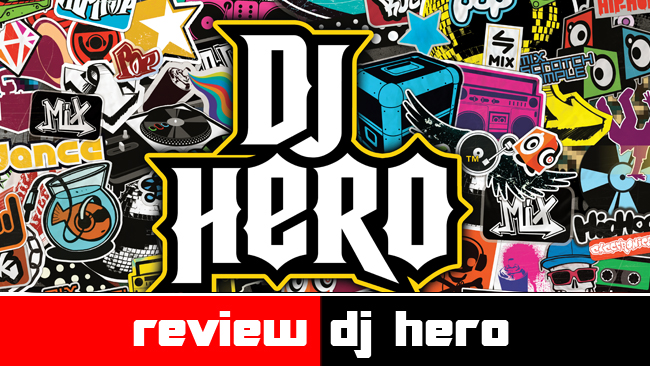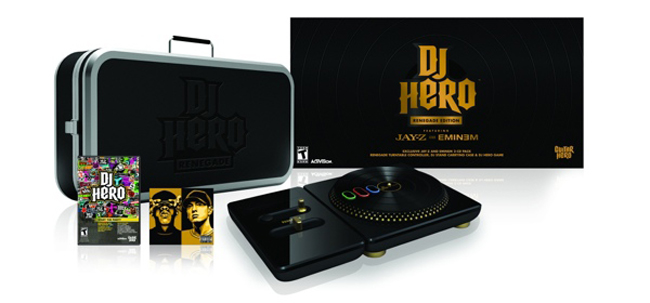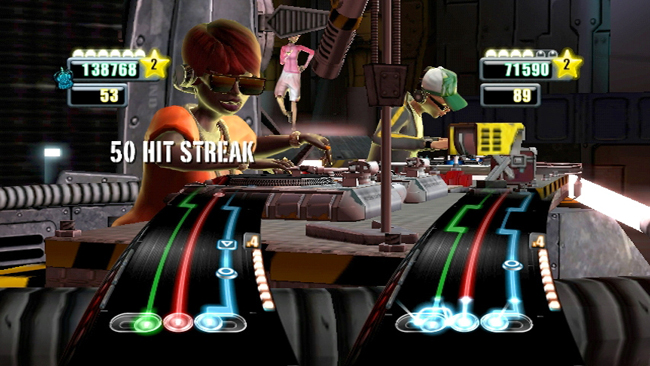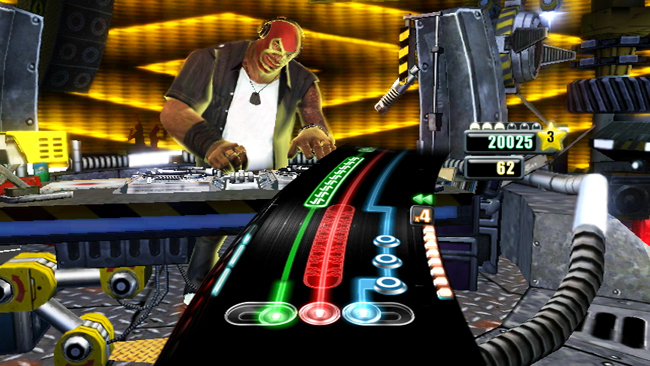
“DJHero does for the genre what the original Guitar Hero did: satisfy the innovative niche and focus on the core experience of playing music.“
Vitals
Game: DJ Hero
Developer/Publisher: FreeStyle Games for Activision
Released: October 2009
Platforms: Wii, XBox 360, PS3
I’m a weekend deejay. On any given Saturday in the Detroit area, I can be found spinning popular music, hip hop, dance, or even wedding songs. My turntables are my most prized instruments, and I’m able to get a crowd to gleefully fill the dance floor for well into the night. There really is no other thrill like it: controlling the moves, motions, and emotions of people who go absolutely bonkers once you play “their song.”
Over the last few years I’ve been in love with the music rhythm game genre. There is just something about tapping a plastic guitar pretending to jam away at an epic 7-minute song while friends sing out of key that keeps me in love with the games.
When DJ Hero was announced it was easy for me to get excited and say, “This is going to be for me.” Cut to a year later and with a plastic turntable in my hands, I can safely say, “Yes, this is still for me.”
There are many aspects of DJ Hero that can be polarizing. Of these, the two most prudent are the choice of music and the turntable peripheral. Hip hop & dance-infused mash-ups coupled with a controller that mimics actual “turntabling” is new to the gaming world. To say that this is “another game” in the Hero franchise is misleading; it most definitely is not Guitar Hero with a turntable (although the game does have modes to utilize the guitar in multiplayer). To put it in plain words, DJ Hero does for the genre what the original Guitar Hero did: satisfy the innovative niche and focus on the core experience of playing music. And in a game genre where the experience is based on friends duking it out in basements across America, DJ Hero is a welcome departure.
Positives

– Turntablism: Firstly, DJ Hero is a game. But, with all of the hand swapping, scratching, and sliding motions, the game has much more of a sim element to its design than other rhythm games. And with enough knobs, sliders, and buttons to confuse the typical gamer the average deejay might feel right at home.
– Niche: DJ Hero isn’t designed for the masses. Rather, it’s designed for those who are already comfortable with deejay equipment, or want to be. Where other games require mastery of hitting the big, colorful buttons on screen just right DJ Hero allows for a low-level of freedom in mixing. If I don’t like one song in a mash-up, I can slide to the other, as long as I hit the note at the right time. The default no-fail mode is perfect for this, and the ability to select sets of effects can create a new mix each time. In fact, the game is more about performance than about scoring or perfection. In a way it pushes for a level of creativity that hasn’t really been seen in rhythm games before.
– Music: The music in DJ Hero is vastly different from most other rhythm games, featuring hip-hop and dance mash-ups and dusted with a few pop and R&B hits. The sometimes awkward, always intriguing mixes act like an iTunes playlist for the confused college graduate. With songs and remixes from the likes of Afrika Bambaata, Jay-Z, Eminem, Daft Punk, the Jackson 5 and DJ AM, the soundtrack is phenomenal. DJ Hero brings a style of head-bobbing music to gaming that hadn’t really been explored before.

– Single Player Mode: The game focuses heavily on single-player, guiding the gamer through career set lists that open up as stars are collected for positive performances. All songs are available for a quick play, for those who just want to jam along at a party or don’t want to sit through a career mode. The set lists are themed with focuses on retro mash-ups or more modern, Jay-Z & Eminem hits. The ability to choose a character is nice, and several new ones are opened up along the way, but I’d still rather recreate my own likeness if possible. The progression is similar to any other major rhythm game: start off small and work towards giant venues and more equipment until completion of all set lists. It isn’t actually all that interesting or new, but it does provide a bit of a carrot with its unlockables. DJ Hero is founded in single-player, just like the most basic of real deejay experiences, and it’s fine that way.
– The Turntable: Ahh, here is what the game’s foundation is built upon. The turntable peripheral is an exercise in industrial design that more accurately captures the feel of the instrument it is intended to be than the guitars and drums of other games. Next to the vinyl decks I own, the only real difference is the size (and the colored buttons, of course). Built solid and with great craftsmanship, the peripheral sits nicely on my lap or the table I use to play it on. The table rotates well, albeit with an ever-so-slight wobble, and feels like a good direct-drive deck providing consistent spin in either direction. The FX knob doesn’t feel like it can be broken off, and the cross-fader has a good proportion to it. The matte finish of the mixer is nice, as it hides any dirt or dust fairly well, but comes off fairly plain. It is a bit devoid of personalization, too, as no stickers or decals came packaged with the game (you’ll have to splurge on the Renegade Edition for those).
Negatives

– Party Foul: While there is some multiplayer included in the game, both locally and online, it is limited to one other person and requires either a second $120 turntable or a guitar — which only works on limited songs, by the way. The game is great to listen to at a party, but it definitely isn’t going to start one. Dueling microphones seem like an obvious choice for an addition, as it would have allowed other players to rap or sing along to the tunes being mixed. The online multiplayer is broken in that there is rarely ever anyone online to play against. Perhaps as more copies sell down the line this will (hopefully) change. Until then, it’s single player all the way.
– Darth Fader: The cross-fader is great when sliding from all the way left to all the way right and back. However I found that during the fade spikes it was especially difficult to slide it left and back to center with confidence. I would often unintentionally over-slide, causing one of the songs to fade out and ending good note streaks. The game needs to have a bit more freedom in the spikes and positioning of the fader.
– Visuals: The review copy I received for the Wii looked fine, except for the crowd and venue close-ups that turned into some of the worst pixelation possible. Upon playing the XBox 360 version ,I realized that the crowd didn’t get any better with high-def visuals. DJ Hero misses the mark in its presentation. It tries too much to be a traditional rhythm game and forgets that the player is a completely different kind of person. Leave the big stadiums and concert halls and focus more on small, secluded and personal clubs. That’s where prime deejays like to spin anyways. The game could have simply gone the route of showing a trippy visualizer with a deejay in front and I would have been happy.
In Conclusion
DJ Hero is almost like a reboot of the Hero franchise: it focuses on core gameplay and the singular experience shared with a turntable instead of building in features. Deejays especially will have an easier, more enjoyable time with it. It sells itself well on being something different, yet familiar enough that it can appeal to a rhythm gamer once enough time is given. With that said, the game is ripe for becoming a cult hit that slowly picks up steam over time. It reminds me of another rhythm game that started off much the same way, played with a plastic guitar and a pocketful of epic, that went on to rule the gaming world.
This review is based on a review copy of the game and controller for the Nintendo Wii sent from Activision. The career mode was completed. Online multiplayer was attempted, but did not work (no one online to play).

4 Comments